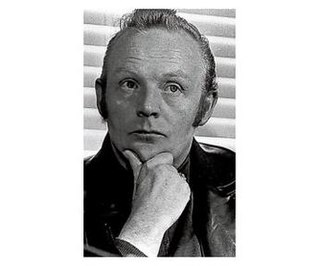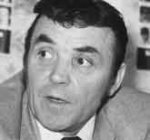
The Ulster Defence Association (UDA) is an Ulster loyalist paramilitary group in Northern Ireland. It was formed in September 1971 as an umbrella group for various loyalist groups and undertook an armed campaign of almost 24 years as one of the participants of the Troubles. Its declared goal was to defend Ulster Protestant loyalist areas and to combat Irish republicanism, particularly the Provisional Irish Republican Army (IRA). In the 1970s, uniformed UDA members openly patrolled these areas armed with batons and held large marches and rallies. Within the UDA was a group tasked with launching paramilitary attacks that used the cover name Ulster Freedom Fighters (UFF) so that the UDA would not be outlawed. The British government proscribed the UFF as a terrorist group in November 1973, but the UDA itself was not proscribed until August 1992.
A loyalist feud refers to any of the sporadic feuds which have erupted almost routinely between Northern Ireland's various loyalist paramilitary groups during and after the ethno-political conflict known as the Troubles broke out in 1969. The feuds have frequently involved problems between and within the Ulster Defence Association (UDA) and the Ulster Volunteer Force (UVF) as well as, later, the Loyalist Volunteer Force (LVF).

John "Jackie" McDonald is a Northern Irish loyalist and the incumbent Ulster Defence Association (UDA) brigadier for South Belfast, having been promoted to the rank by former UDA commander Andy Tyrie in 1988, following John McMichael's killing by the Provisional IRA in December 1987. He is also a member of the organisation's Inner Council and the spokesman for the Ulster Political Research Group (UPRG), the UDA's political advisory body.
William Hull was a loyalist activist in Northern Ireland. Hull was a leading figure in political, paramilitary and trade union circles during the early years of the Troubles. He is most remembered for being the leader of the Loyalist Association of Workers, a loyalist trade union-styled movement that briefly enjoyed a mass membership before fading.

Tommy Herron was a Northern Ireland loyalist and a leading member of the Ulster Defence Association (UDA) until his death in a fatal shooting. Herron controlled the UDA in East Belfast, one of its two earliest strongholds. From 1972, he was the organisation's vice-chairman and most prominent spokesperson, and was the first person to receive a salary from the UDA.
Andrew Tyrie is a Northern Irish loyalist paramilitary leader who served as commander of the Ulster Defence Association (UDA) during much of its early history. He took the place of Tommy Herron in 1973 when the latter was killed, and led the organisation until March 1988 when an attempt on his life forced him to resign from his command.
Charles Harding Smith was a loyalist leader in Northern Ireland and the first effective leader of the Ulster Defence Association (UDA). An important figure in the Belfast-based "defence associations" that formed the basis of the UDA on its formation in 1971, Smith later became embroiled in feuds with other UDA leaders and was eventually driven out of Northern Ireland by his opponents.
H. David "Davy" Payne was a senior Northern Irish loyalist and a high-ranking member of the Ulster Defence Association (UDA) during the Troubles, serving as brigadier of the North Belfast Brigade. He was first in command of the Shankill Road brigade of the Ulster Freedom Fighters (UFF), which was the "cover name" of the militant branch of the UDA. The group was responsible for a series of abductions and killings of mostly Catholic civilians in the early 1970s.

James Pratt Craig was a Northern Irish loyalist paramilitary during The Troubles in Northern Ireland in the latter half of the 20th century, who was a member of the Ulster Defence Association (UDA), and a command member of its Inner Council. He also ran a criminal large-scale protection racket from the West Belfast Shankill Road area, where he resided. Described by journalist David McKittrick as "Belfast's foremost paramilitary extortionist", Craig allegedly colluded at times with the enemies of the UDA, Irish Republican groups such as the Provisional Irish Republican Army (IRA) and Irish National Liberation Army (INLA), providing them with information on key loyalists which led to their subsequent murders. Aside from controlling rackets and extorting protection money from a variety of businesses, it was claimed that Craig also participated in paramilitary murders.

Tommy "Tucker" Lyttle, was a high-ranking Ulster loyalist during the period of religious-political conflict in Northern Ireland known as "the Troubles". A member of the Ulster Defence Association (UDA) – the largest loyalist paramilitary organisation in Northern Ireland – he first held the rank of lieutenant colonel and later was made a brigadier. He served as the UDA's spokesman as well as the leader of the organisation's West Belfast Brigade from 1975 until his arrest and imprisonment in 1990. According to journalists Henry McDonald and Brian Rowan, and the Pat Finucane Centre, he became a Royal Ulster Constabulary (RUC) Special Branch informer.

The Woodvale Defence Association (WDA) was an Ulster loyalist vigilante group in the Woodvale district of Belfast, an area immediately to the north of the Shankill Road.
William McQuiston, also known as "Twister", is an Ulster loyalist, who was a high-ranking member of the Ulster Defence Association (UDA). Leader of the organisation's A Company, Highfield, West Belfast Brigade, McQuiston spent more than 12 years in HM Prison Maze outside Lisburn for possession of weapons. He is now a community activist, often working with former members of the Provisional Irish Republican Army (IRA) in West Belfast's troubled interface areas where adjoining loyalist and republican communities occasionally clash.
David "Davy" Fogel, also known as "Big Dave", was a former loyalist and a leading member of the loyalist vigilante Woodvale Defence Association (WDA) which later merged with other groups becoming the Ulster Defence Association (UDA). Born in London, Fogel was a former British soldier who had served in Northern Ireland before marrying a local Belfast woman and settling down with his family in Woodvale, Belfast.
Samuel McCormick was a Northern Irish loyalist who served from 1973 until the 1980s as the brigadier for the Ulster Defence Association's (UDA) East Belfast Brigade. He had taken over the command following the shooting death of its former leader Tommy Herron.
William Elliot was a former Northern Irish loyalist who served as brigadier of the Ulster Defence Association's (UDA) East Belfast Brigade in the 1980s.
The UDA West Belfast Brigade is the section of the Ulster loyalist paramilitary group, the Ulster Defence Association (UDA), based in the western quarter of Belfast, in the Greater Shankill area. Initially a battalion, the West Belfast Brigade emerged from the local "defence associations" active in the Shankill at the beginning of the Troubles and became the first section to be officially designated as a separate entity within the wider UDA structure. During the 1970s and 1980s the West Belfast Brigade was involved in a series of killings as well as establishing a significant presence as an outlet for racketeering.

Ernest "Ernie" Elliott, nicknamed "Duke", was a Northern Irish loyalist activist and a leading member of the Ulster Defence Association (UDA) during its early days. Unusually for the generally right-wing UDA, Elliott expressed admiration for socialism and communism, and frequently quoted the words of Che Guevara and Karl Marx. Elliott was eventually killed by a fellow UDA member following a drunken brawl, although his death was variously blamed on republicans and a rival faction within the UDA.
Samuel Smyth was a Northern Irish loyalist activist. A founder member of the Ulster Defence Association (UDA) he was the early public face of the movement as the organisation's spokesman, and he later became involved in the group's attempts to politicise. He was assassinated by the Provisional IRA as part of the Troubles. Author Steve Bruce described Smyth as the "sometime editor of the Ulster Militant and a loose cannon who enjoyed an exciting and erratic relationship with the UDA".
Hester Rogers is a Northern Irish former loyalist activist and writer who was a member of the Ulster Defence Association's (UDA) political wing during the period of religious-political conflict known as the Troubles. She headed the UDA's women's department and ran the public relations and administration section at the organisation's headquarters in Gawn Street, off the Newtownards Road. An outspoken critic of strip searching female prisoners, she was a founder and activist for "Justice For Lifers", an organisation which advocated prison reform in Northern Ireland.

The UDA South Belfast Brigade is the section of the Ulster loyalist paramilitary group, the Ulster Defence Association (UDA), based in the southern quarter of Belfast, as well as in surrounding areas. Initially a battalion, the South Belfast Brigade emerged from the local "defence associations" active in the city at the beginning of the Troubles. It subsequently emerged as the largest of the UDA's six brigades and expanded to cover an area much wider than its initial South Belfast borders.







